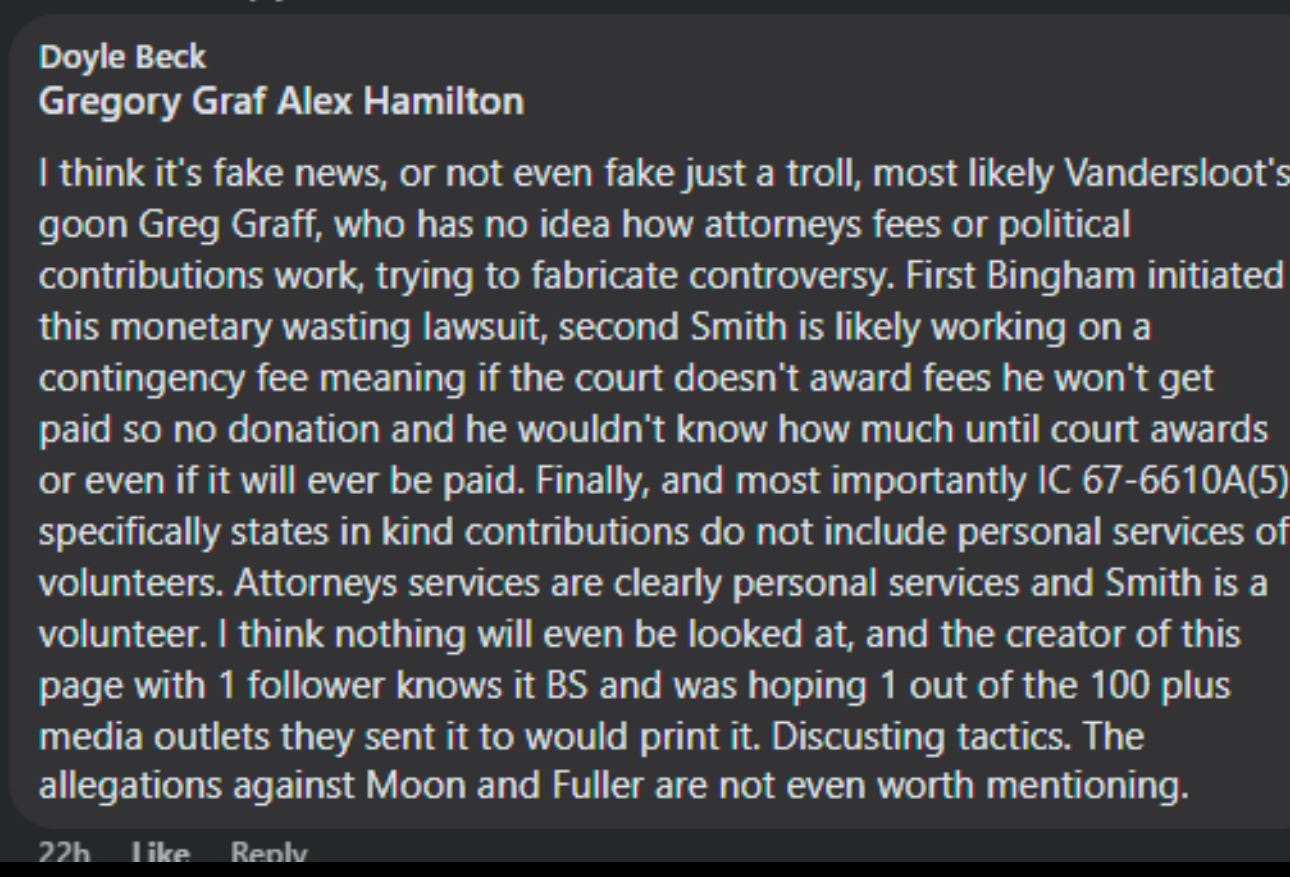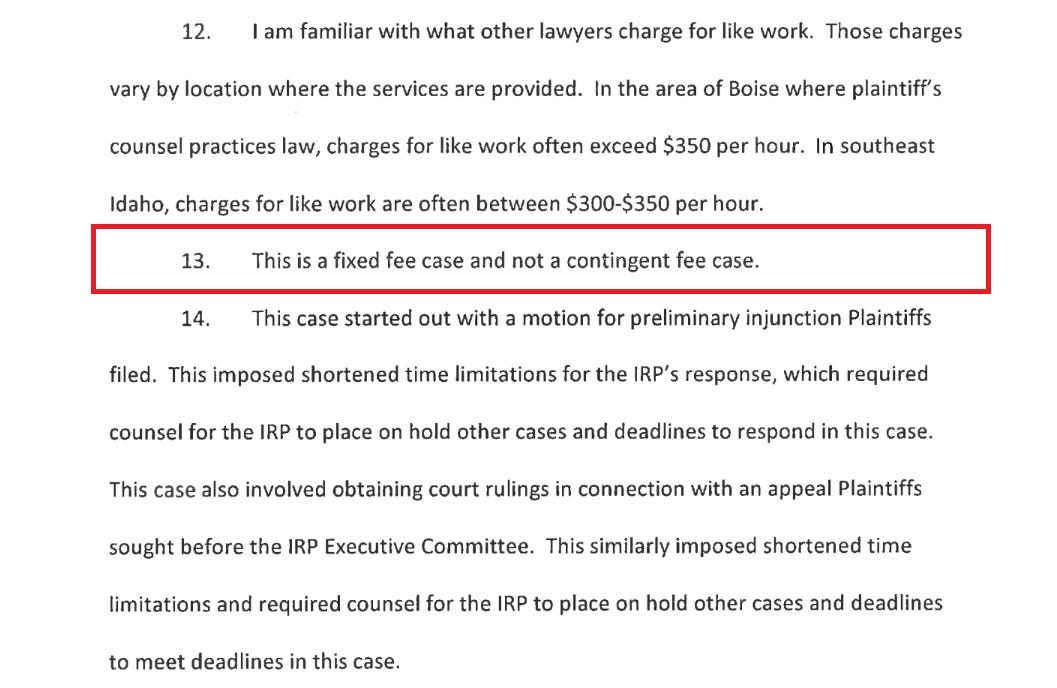The Idaho GOP's Legal Shell Game
What are Dorothy Moon, Mark Fuller, Doyle Beck, and Bryan Smith so afraid of?
Bryan Smith’s ability to maneuver within Idaho’s legal and political systems has long been a subject of scrutiny, but new revelations raise deeper concerns about his tactics. A growing pile of formal complaints accuses Smith—the National Committeeman for the Idaho Republican Party and a practicing attorney—of engaging in legal and ethical misconduct. What initially appeared to be just another example of Smith’s brand of hardball politics has escalated into a question of whether he has violated campaign finance laws and entangled the Idaho GOP in a financial and ethical quagmire.
The latest controversy stems from the Idaho GOP’s lawsuit battle with the Bingham County Republican Central Committee. While that case is closed, the financial and ethical implications continue to ripple outward. In court filings, Smith seeks over $82,000 in legal fees for his representation of the Idaho GOP. However, Doyle Beck, a longtime ally of Smith and fellow board member of the Idaho Freedom Foundation, insists Smith acted as a volunteer attorney and is merely the victim of a “fake news” campaign. Beck’s public statements not only contradict Smith’s own legal filings but also raise serious questions about whether the Idaho GOP has been forthright in its financial disclosures.
Over the past few days, Smith and his allies have done everything possible to deflect scrutiny. They have trotted out the usual defenses—claims of political attacks, baseless accusations, and conspiracy theories meant to distract from the central issue. But the slow drip of details tells a different story.
Then came Beck’s public rant, dismissing the entire controversy as the work of bad-faith actors. He claimed Smith was simply a volunteer and that his legal work was likely done on a contingency basis—meaning he would only be paid if the court awarded fees. His confident, almost dismissive response suggested he expected everyone to take his word for it.
If party volunteers were there to stuff fundraising letters in envelopes, put up signs, bake cookies, and blow up balloons, $82,000 would account for a lot of balloons and cookies, but this was something much different.
There’s just one problem: Bryan Smith’s own sworn declaration contradicts Beck’s defense.
Smith’s court filing, submitted under penalty of perjury, explicitly states: "This is a fixed fee case and not a contingent fee case." The distinction is critical. If Smith were working on contingency, there would be no expectation of payment unless a court awarded fees. But a fixed fee means the Idaho GOP likely owed Smith’s firm from the outset. If the party incurred legal fees, why were they not reported as expenditures, debts, or in-kind contributions, as required under Idaho law? And if Smith was truly a volunteer, why is his firm now demanding tens of thousands of dollars in reimbursement?
This isn’t just a minor discrepancy—it is a blatant contradiction that points to a much larger issue. Under Idaho Code §67-6607, political parties must disclose all expenditures, debts, and in-kind contributions. The Federal Election Commission (FEC) also requires complete transparency in financial reporting for party committees. It would appear that any failure to report $82,000 in legal fees by the Idaho GOP would not be just an oversight—it’s a glaring red flag if Smith’s firm donated the legal services that should have been disclosed as an in-kind contribution. If the Idaho GOP had an agreement to pay for the services, it should have been recorded as a debt. The fact that neither happened suggests either negligence or an effort to obscure the financial arrangement.
However, Beck’s misdirection wasn’t just about Smith. It served another purpose: keeping attention away from Idaho GOP Chair Dorothy Moon and First Vice Chair Mark Fuller. While all eyes were on the question of Smith’s legal fees, few were asking what Moon and Fuller knew when they knew it and why they failed to ensure compliance with financial disclosure laws.
Smith’s dual role as the Idaho GOP National Committeeman and its legal counsel further complicates matters. Under Moon’s leadership, the Idaho GOP may have relied on Smith’s firm for legal strategy, but it’s not clear where his loyalties lie—with the party or with his firm’s financial interests. As a National Committeeman, Smith should advocate for Idaho Republicans on the national stage. Instead, he appears to be entangling the party in legal battles while positioning his law firm to benefit from the resulting chaos and racking up legal fees.
Smith, Moon, Fuller, and even Beck want to hang the $82,000+ on the neck of local Bingham County Republican Central Committee chairman Matt Thompson, a local rancher and longtime volunteer, holding him personally liable for the fees. This looks like an attempt to punish Thompson for not rolling over and allowing Moon to install a hand-picked loyalist for chairman when the former chair moved out of state.
Smith’s legal maneuvering is now under scrutiny, and his allies are scrambling to dismiss the complaints as politically motivated attacks. Beck, in particular, has lashed out against those raising concerns, claiming that the complaints are nothing more than a smear campaign. In an attempt to deflect, Beck has even accused me—Gregory Graf—of being behind an anonymous group known as Party Watch, which recently distributed an email outlining the ethical complaints against Idaho GOP leadership. Let me be clear: I have no connection to Party Watch and did not send the email in question. Beck’s reckless attempt to pin these allegations on me is not just false—it is a predictable tactic from a group that thrives on misinformation. When confronted with legitimate concerns about possible corruption and legal misconduct, their response is not to provide transparency but to manufacture a conspiracy theory to distract from the facts.
The investigations into Smith’s actions are ongoing, but the questions remain: If Bryan Smith did nothing wrong, why do his own legal filings contradict the public statements of his allies? Why wasn’t the $82,000 in legal fees disclosed? And if this is all just a political hit job, why do these complaints to multiple organizations and agencies—from the FEC to the Idaho State Bar—show that this might be worth investigating?
The Idaho GOP will never hold him accountable as long as Smith’s friends control the party. Voters need to educate themselves, understand the role of Precinct Committee Officers (PCOs), and work to elect local representatives who are not loyalists to the Moon, Smith, Fuller, and Beck Marxist cabal. This style of corruption can only be rooted out by voting in better local party representatives who will throw these scoundrels out with yesterday’s smelly garbage.
At a time when the Idaho GOP is desperately soliciting $10 donations to cover office rent, is this latest legal mess yet another reckless scheme from the same group that has repeatedly pushed half-baked, self-serving ideas? How many more bad decisions, ethical lapses, and financial missteps will it take before party members demand accountability? Smith’s latest legal shell game may have served him well in the past, but as the investigations mount, his house of cards is looking increasingly unstable. Whether he finally faces the consequences or manages to wriggle out of this latest scandal will ultimately depend on how soon voters wake up and realize they can drive him and his wanna-be mobsters out of the party.
To see the court records, legal filings, and complaints made by Party Watch on the Bryan Smith / Bingham County Republican Central Committee case, click here and review the documents yourself.
About the Author
Gregory Graf is the creator of Political Potatoes and a lifelong conservative Republican. His articles often criticize the hypocrisy committed by far-right grifters who’ve taken control of the GOP. Graf is the CEO of Snake River Strategies, a communications and political consulting firm based in Eagle, Idaho. He and his family moved to Idaho Falls from Utah in 2013 and reside in Star.
Disclaimer
The following is intended to convey an opinion on newsworthy events of public concern regarding public figures and/or public officials in exercising their official duties. No implications or inferences—beyond those explicitly stated in the preceding— are intended to be conveyed or endorsed by the Author. Wherever available, hyperlinks have been provided to allow readers to directly access any underlying assertions of fact upon which this opinion is based.






Bryan Smith was criticized by a judge for his excessive fees as a debt collector
This reminds me of the quote, “Oh, what a tangled web we weave, when first we practice to deceive.” — “Marmion” by Sir Walter Scott.